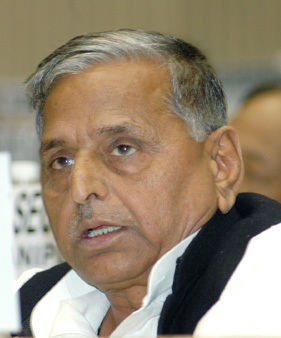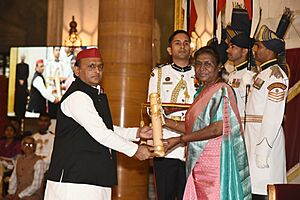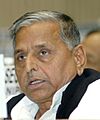Mulayam Singh Yadav facts for kids
Quick facts for kids
Mulayam Singh Yadav
|
|
|---|---|

Mulayam Singh in 2006
|
|
| 21st Minister of Defence | |
| In office 1 June 1996 – 19 March 1998 |
|
| Prime Minister | |
| Preceded by | Pramod Mahajan |
| Succeeded by | George Fernandes |
| 15th Chief Minister of Uttar Pradesh | |
| In office 29 August 2003 – 13 May 2007 |
|
| Preceded by | Mayawati |
| Succeeded by | Mayawati |
| In office 5 December 1993 – 3 June 1995 |
|
| Preceded by | President's rule |
| Succeeded by | Mayawati |
| In office 5 December 1989 – 24 June 1991 |
|
| Preceded by | N. D. Tiwari |
| Succeeded by | Kalyan Singh |
| Member of Parliament, Lok Sabha | |
| In office 23 May 2019 – 10 October 2022 |
|
| Preceded by | Tej Pratap Singh Yadav |
| Succeeded by | Dimple Yadav |
| Constituency | Mainpuri, Uttar Pradesh |
| In office 16 May 2014 – 23 May 2019 |
|
| Preceded by | Ramakant Yadav |
| Succeeded by | Akhilesh Yadav |
| Constituency | Azamgarh, Uttar Pradesh |
| In office 16 May 2009 – 16 May 2014 |
|
| Preceded by | Dharmendra Yadav |
| Succeeded by | Tej Pratap Singh Yadav |
| Constituency | Mainpuri, Uttar Pradesh |
| In office 1998–2004 |
|
| Preceded by | D. P. Yadav |
| Succeeded by | Ram Gopal Yadav |
| Constituency | Sambhal, Uttar Pradesh |
| In office 1996–1998 |
|
| Preceded by | Uday Pratap Singh |
| Succeeded by | Balram Singh Yadav |
| Constituency | Mainpuri, Uttar Pradesh |
| Guidance Leader of the Samajwadi Party | |
| In office 1 January 2017 – 10 October 2022 |
|
| President | Akhilesh Yadav |
| Preceded by | post established |
| Succeeded by | post abolished |
| President of the Samajwadi Party | |
| In office 3 October 1992 – 1 January 2017 |
|
| Preceded by | post established |
| Succeeded by | Akhilesh Yadav |
| Personal details | |
| Born | 22 November 1939 Saifai, United Provinces, British India (present-day Etawah, Uttar Pradesh, India) |
| Died | 10 October 2022 (aged 82) Gurugram, Haryana, India |
| Political party | Samajwadi Party (1992–2022) |
| Other political affiliations |
|
| Spouses |
|
| Relations | The Yadav Family |
| Children | 1 (Akhilesh Yadav) |
| Alma mater |
|
| Occupation |
|
| Awards | Padma Vibhushan (2023) (posthumous) |
Mulayam Singh Yadav (born 22 November 1939 – died 10 October 2022) was an important Indian politician. He was a strong supporter of socialism and started the Samajwadi Party. He spent over 60 years in politics.
He served three times as the Chief Minister of Uttar Pradesh, which is a big state in India. He was also the Defence Minister for the whole country. Mulayam Singh Yadav was a Member of Parliament seven times. He also served as a member of the state assembly ten times. People often called him Netaji (meaning respected leader) and Dhartiputra (son of mother earth). In 2023, he received the Padma Vibhushan, India's second-highest civilian award, after his death.
Contents
Early Life and Education
Mulayam Singh Yadav was born on 22 November 1939. His parents were Murti Devi and Sughar Singh Yadav. He was born in Saifai village, in the Etawah district of Uttar Pradesh, India.
He had one son, Akhilesh Yadav, from his first marriage to Malti Devi.
Yadav studied political science at college. He earned three degrees:
- A B.A. from Karm Kshetra Post Graduate College in Etawah.
- A B.T. from A. K. College in Shikohabad.
- An M.A. from B. R. College, Agra University.
Teaching Career
Before he became a full-time politician, Mulayam Singh Yadav was a teacher. In 1963, he worked as a schoolmaster at Jain Inter-College in Karhal, Mainpuri. After getting his master's degree, he was promoted to a lecturer in 1974.
Political Journey
Mulayam Singh Yadav learned from famous leaders like Ram Manohar Lohia. He was first elected as a MLA in 1967. This was for the Legislative Assembly of Uttar Pradesh from Jaswantnagar. He ran with the Samyukta Socialist Party (SSP).
In 1975, during a time called the Emergency, Yadav was arrested. He was held for 19 months.
He became a state minister for the first time in 1977. Later, in 1980, he became the head of the Lok Dal (People's Party) in Uttar Pradesh. This party later joined the Janata Dal. From 1982 to 1985, he was the leader of the opposition in the Uttar Pradesh Legislative Council. When the Lok Dal party split, Yadav started his own party called Krantikari Morcha.
Chief Minister of Uttar Pradesh
Mulayam Singh Yadav served as the Chief Minister of Uttar Pradesh three times.
First Term as Chief Minister
Yadav first became Chief Minister of Uttar Pradesh in 1989.
In 1990, a large group of people marched towards the Babri Masjid mosque in Ayodhya. They wanted to build a temple there. This led to clashes with police. Yadav allowed the police to use force to control the crowd. Official records say at least 17 people were killed. Many Muslims in Uttar Pradesh believed Yadav saved the mosque in 1990. This made his party popular among them.
His government continued with support from the Indian National Congress (INC). But in April 1991, the INC stopped supporting him. This caused his government to fall. In the elections that followed, his party lost power to the BJP.
Second Term as Chief Minister
In 1992, Yadav started his own party, the Samajwadi Party (Socialist Party). In 1993, he teamed up with the Bahujan Samaj Party for the state elections. This alliance stopped the BJP from returning to power.
In 1993, Yadav became Chief Minister of Uttar Pradesh for the second time. He had support from the Congress and Janata Dal. During this time, there was a movement for a separate state called Uttarakhand. On 2 October 1994, there was a shooting incident involving activists from this movement. Many people blamed Yadav for this event. He remained Chief Minister until June 1995.
Third Term as Chief Minister
In 2002, the Bharatiya Janata Party and Bahujan Samaj Party formed a government. This government was led by Mayawati, who was a big political rival for Yadav. On 25 August 2003, the BJP left the government. Enough lawmakers from the Bahujan Samaj Party also left. This allowed Mulayam Singh Yadav to become Chief Minister again. He had support from independent politicians and smaller parties.
He was sworn in as Chief Minister for the third time in September 2003. At this time, he was also a member of the Lok Sabha (national parliament). To meet the rules, he ran in a state assembly election in January 2004. He won by a very large number of votes.
Hoping to play a bigger role in national politics, Yadav ran in the 2004 Lok Sabha elections. He won his seat, and his Samajwadi Party won many seats in Uttar Pradesh. However, the Congress party formed the national government. So, Yadav could not play a big role at the national level. He resigned from the Lok Sabha. He chose to stay as Chief Minister of Uttar Pradesh until the 2007 elections. In those elections, he lost to the BSP.
National Politics and Defence Minister
Mulayam Singh Yadav was elected to the Uttar Pradesh state assembly ten times. He was also elected to the Parliament of India (Lok Sabha) seven times.
Minister of Defence for India
In 1996, Yadav was elected to the national parliament from Mainpuri. His party joined a group of parties that formed the government. He was then named India's Defence Minister. This government ended in 1998, and new elections were held. He was re-elected to the Lok Sabha from Sambhal.
One important decision he made as Defence Minister was about fallen soldiers. He changed the law to make sure that the bodies of soldiers who died in service were brought home with full respect. They would also receive a mandatory state funeral. It was also during his time that India decided to buy the advanced Sukhoi Su-30 MKI fighter jets for the Indian Air Force.
Member of Parliament Terms
- 1999 General Election: He won from two areas, Sambhal and Kannauj. He later gave up the Kannauj seat for his son, Akhilesh.
- 2014 General Election: He was elected to the 16th Lok Sabha from Azamgarh and Mainpuri. He later resigned from the Mainpuri seat to keep Azamgarh.
- 2019 General Election: He was re-elected from Mainpuri for the fifth time. This was his fourth win in a row from that area. He passed away in 2022, before his term ended.
Samajwadi Party
Mulayam Singh Yadav started his own party, the Samajwadi Party, in 1992. The party became known for supporting Muslims and other minority groups in Uttar Pradesh.
Later, his family faced some disagreements within the party. His son, Akhilesh Yadav, became Chief Minister of Uttar Pradesh in 2012. This led to a split between Akhilesh's supporters and those who supported Mulayam Singh and his brother, Shivpal Yadav.
In December 2016, Mulayam Yadav briefly removed his son Akhilesh from the party. However, he changed his mind 24 hours later. After this, Akhilesh became the new national leader of the party. Mulayam Singh was then named the chief patron.
Important Positions Held
Mulayam Singh Yadav held many important positions throughout his career:
- He was elected as a MLA (state lawmaker) 10 times.
- He was elected as a Lok Sabha MP (national lawmaker) 7 times.
- He served as Chief Minister of Uttar Pradesh three times.
- He was the Defence Minister of India.
- He was also the Leader of the Opposition in the Uttar Pradesh Legislative Council.
Political Beliefs
Socialism
Mulayam Singh Yadav strongly believed in Socialism. In the 1980s, the Indian government set up the Mandal Commission. This group was meant to find "socially backward classes" in India. There were protests across the country about this. Yadav supported the demands of these backward groups and religious minorities. Through these actions, he became known as a socialist leader.
Support for Tibet
Yadav believed that India should support a free and independent Tibet. He said that a past government made a "big mistake" on this issue. He felt that Tibet was a natural barrier between China and India. He thought India should support the Dalai Lama and Tibet's independence.
Personal Life and Passing
Mulayam Singh Yadav was married twice. His first wife, Malti Devi, passed away in May 2003. They had one son, Akhilesh Yadav. Akhilesh later became the Chief Minister of Uttar Pradesh from 2012 to 2017.
Mulayam Singh later married Sadhana Gupta. Sadhana Gupta had a son named Prateek Yadav from her first marriage. Sadhana Gupta passed away in July 2022.
Family Tree
The Yadav family is well-known in Uttar Pradesh politics. Mulayam Singh Yadav had four brothers and a sister. Ram Gopal Yadav is his cousin.
| Family tree of Mulayam Singh Yadav | |||||||||||||||||||||||||||||||||||||||||||||||||||||||||||||||||||||||||||||||||||||||||||||||||||||||||||||||||||||||||||||||||||||||||||||||||||||||||||||||||||||||||||||||||||||||||||||||||||||||||||||||||||||||||||||||||||||||||||||||||||||||||||||||||||||||||||||||||||||||||||||||||||||||||||||||||||||||||||||||||||||||||||||||||||||||||||||||||||||||||||||||||||||||||||||||||||||||||||||||||||||||||||||||||||||||||||||||||||||||||||||||||||||||||||||||||||||||||||||||||||||||||||||||||||||||||||||||||||||||||||||||||||||||||||||||||||||||||||||
|---|---|---|---|---|---|---|---|---|---|---|---|---|---|---|---|---|---|---|---|---|---|---|---|---|---|---|---|---|---|---|---|---|---|---|---|---|---|---|---|---|---|---|---|---|---|---|---|---|---|---|---|---|---|---|---|---|---|---|---|---|---|---|---|---|---|---|---|---|---|---|---|---|---|---|---|---|---|---|---|---|---|---|---|---|---|---|---|---|---|---|---|---|---|---|---|---|---|---|---|---|---|---|---|---|---|---|---|---|---|---|---|---|---|---|---|---|---|---|---|---|---|---|---|---|---|---|---|---|---|---|---|---|---|---|---|---|---|---|---|---|---|---|---|---|---|---|---|---|---|---|---|---|---|---|---|---|---|---|---|---|---|---|---|---|---|---|---|---|---|---|---|---|---|---|---|---|---|---|---|---|---|---|---|---|---|---|---|---|---|---|---|---|---|---|---|---|---|---|---|---|---|---|---|---|---|---|---|---|---|---|---|---|---|---|---|---|---|---|---|---|---|---|---|---|---|---|---|---|---|---|---|---|---|---|---|---|---|---|---|---|---|---|---|---|---|---|---|---|---|---|---|---|---|---|---|---|---|---|---|---|---|---|---|---|---|---|---|---|---|---|---|---|---|---|---|---|---|---|---|---|---|---|---|---|---|---|---|---|---|---|---|---|---|---|---|---|---|---|---|---|---|---|---|---|---|---|---|---|---|---|---|---|---|---|---|---|---|---|---|---|---|---|---|---|---|---|---|---|---|---|---|---|---|---|---|---|---|---|---|---|---|---|---|---|---|---|---|---|---|---|---|---|---|---|---|---|---|---|---|---|---|---|---|---|---|---|---|---|---|---|---|---|---|---|---|---|---|---|---|---|---|---|---|---|---|---|---|---|---|---|---|---|---|---|---|---|---|---|---|---|---|---|---|---|---|---|---|---|---|---|---|---|---|---|---|---|---|---|---|---|---|---|---|---|---|---|---|---|---|---|---|---|---|---|---|---|---|---|---|---|---|---|---|---|---|---|---|---|---|---|---|---|---|---|---|---|---|---|---|---|---|---|---|---|---|---|---|---|---|---|---|---|---|---|---|---|---|---|---|---|---|---|---|---|---|---|---|---|---|---|---|---|---|---|---|---|---|---|---|---|---|---|---|---|---|---|---|---|---|---|---|---|---|---|---|---|---|---|---|---|---|---|---|---|---|---|---|---|---|---|---|---|---|---|---|---|---|---|---|---|---|---|---|---|---|---|---|---|---|---|---|---|---|---|---|---|---|
|
|||||||||||||||||||||||||||||||||||||||||||||||||||||||||||||||||||||||||||||||||||||||||||||||||||||||||||||||||||||||||||||||||||||||||||||||||||||||||||||||||||||||||||||||||||||||||||||||||||||||||||||||||||||||||||||||||||||||||||||||||||||||||||||||||||||||||||||||||||||||||||||||||||||||||||||||||||||||||||||||||||||||||||||||||||||||||||||||||||||||||||||||||||||||||||||||||||||||||||||||||||||||||||||||||||||||||||||||||||||||||||||||||||||||||||||||||||||||||||||||||||||||||||||||||||||||||||||||||||||||||||||||||||||||||||||||||||||||||||||
Death
In September 2022, Mulayam Singh Yadav was admitted to the hospital. His health got worse, and he was put on a ventilator. He had been in the hospital for about a month.
Mulayam Singh Yadav passed away on 10 October 2022, at the age of 82. He died in a hospital in Gurgaon. His last rites (funeral ceremony) were held with full state honors in his hometown of Saifai.
Legacy
As the Chief Minister of Uttar Pradesh, Mulayam Singh Yadav helped set up many important educational and medical institutions. These include:
- Dr. Ram Manohar Lohiya National Law University
- Dr. Ram Manohar Lohia Institute of Medical Sciences
- Uttar Pradesh University of Medical Sciences
- Government Medical College, Azamgarh
- Government Medical College, Kannauj
Even before becoming Chief Minister, in 1983, he helped establish a college called Chaudhary Charan Singh Post Graduate College.
As Chief Minister and Defence Minister, he also helped build several airstrips. These include Naini Saini Airport, Chitrakoot Airport, Mohammadabad Airstrip, and Saifai Airstrip.
Images for kids
-
Akhilesh Yadav receiving the Padma Vibhushan award for his late father in 2023
 | William M. Jackson |
 | Juan E. Gilbert |
 | Neil deGrasse Tyson |




